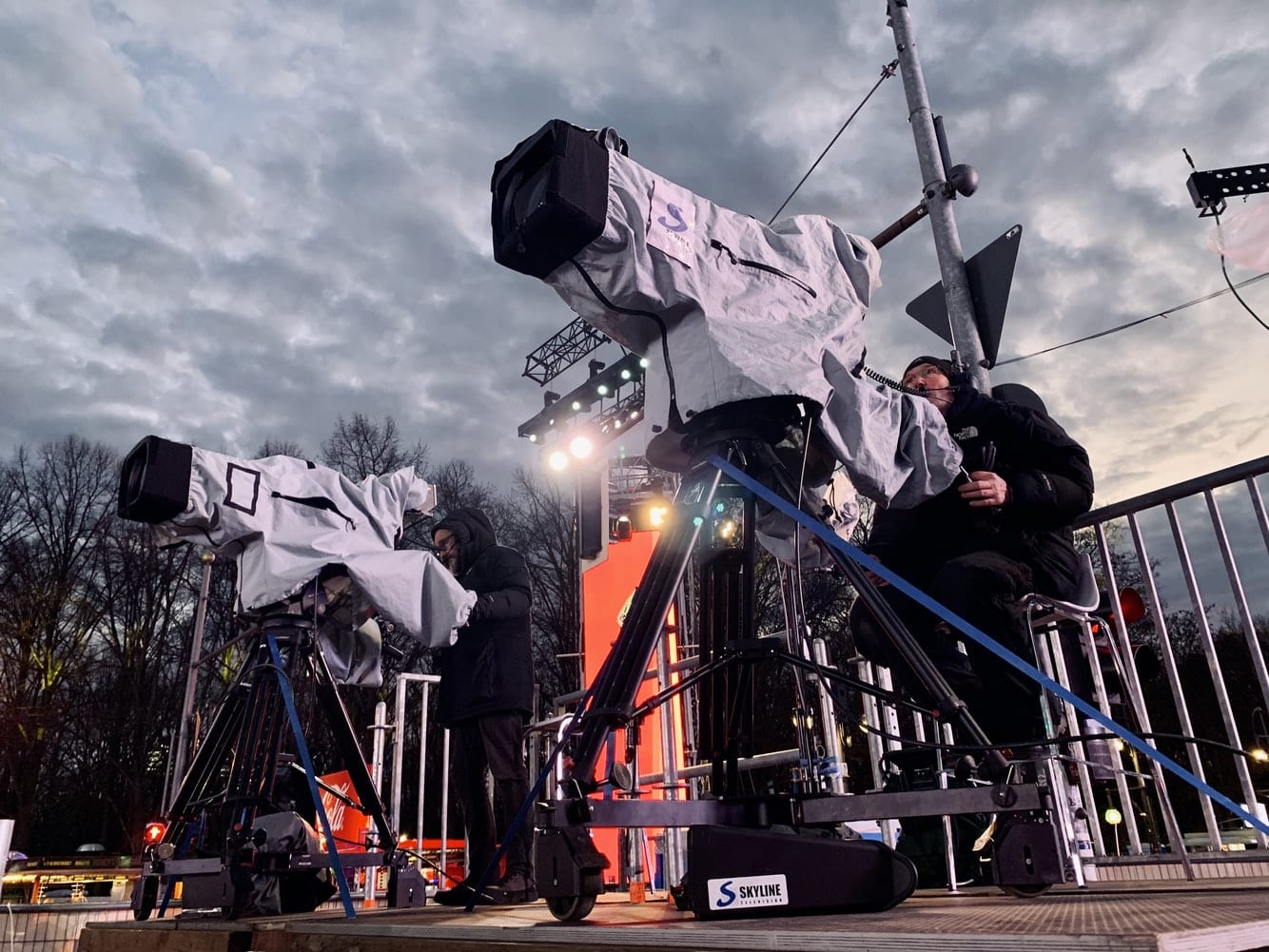Exactly How Event Production Works: A Comprehensive Take A Look At the Process
Event production is a facility and organized process that needs mindful preparation and execution. It begins with developing clear purposes and comprehending the target audience. Each action, from budgeting to place choice, plays a vital role in ensuring success. As the procedure unfolds, various components should align flawlessly. The subtleties of this complex operation usually go unnoticed. What are the key phases that contribute to a remarkable event?

The Initial Planning Phase
When beginning on event production, cautious planning is vital to guarantee an effective end result. The preliminary planning stage functions as the structure for all subsequent efforts. Throughout this stage, event producers must specify the event's function and goals clearly. Recognizing the target market helps customize the experience and messaging, ensuring significance and engagement.Producers must additionally think about the event format, whether it be in-person, digital, or hybrid, as this will affect various logistical components. Choosing a suitable day and venue is critical, as it influences ease of access and availability.Furthermore, assembling a trusted team is fundamental for splitting responsibilities and simplifying interaction. Establishing a timeline with milestones assurances all jobs are completed on time. This stage entails extensive study, including recognizing potential difficulties and devising techniques to minimize risks. Eventually, a well-structured first planning stage establishes the tone for a successful event production journey.

Budgeting and Source Allocation
In event production, efficient budgeting and source appropriation are crucial for success - event production charlotte. Establishing monetary criteria establishes the structure for all succeeding decisions, while resource distribution techniques ensure that every element of the event is effectively sustained. With each other, these aspects aid maintain control over expenditures and optimize the use of offered sources
Developing Financial Parameters
Developing economic criteria is vital to the success of any event production, as it establishes the structure for reliable budgeting and source appropriation. This procedure starts with defining the overall budget, which encompasses all aspects of the event, consisting of place prices, food catering, and advertising. By determining offered funds, event planners can prioritize expenses and designate resources accordingly. Furthermore, it is vital to perform detailed marketing research to expect potential prices and determine funding resources, such as sponsorships or ticket sales. Developing clear financial criteria likewise aids in threat administration, allowing organizers to set apart contingency funds for unexpected expenditures. Eventually, a distinct budget plan functions as a roadmap, assisting the event production team in the direction of accomplishing their objectives while preserving economic control.
Resource Circulation Techniques
Reliable resource circulation techniques are essential for making best use of the effect of an occasion while adhering to budget plan constraints. Successful event production calls for a precise strategy to budgeting and resource allowance. Organizers have to focus on important components such as venue, wedding catering, and technology, making sure that funds are allocated to areas that improve participant experience. A detailed budget plan needs to outline expected costs and determine locations for possible cost savings, such as discussing with suppliers or discovering sponsorship opportunities. Additionally, tracking expenditures throughout the planning process assists stop overspending. By using critical source circulation, event manufacturers can deliver a memorable experience while maintaining fiscal responsibility, ultimately adding to the overall success of the event.
Venue Selection and Logistics
Picking the appropriate place is important to the success of any event, as it sets the phase for the total experience. Location choice includes assessing various factors, including ability, access, and area. Coordinators should consider the target market and the nature of the event, making certain the location lines up with the event's goals.Logistics play a significant duty in this procedure, involving arrangements for seats, audiovisual devices, and catering solutions. A well-chosen venue must assist in smooth flow for participants and personnel, enhancing engagement.Additionally, assessing prospective venues for services like auto parking, washrooms, and fire escape is necessary for safety and security and comfort. The timeline for securing the location is also essential, as prominent areas may schedule rapidly - event production charlotte. Subsequently, extensive preparation and timely implementation can ultimately add to a smooth event experience, making location option and logistics fundamental elements of effective event production
Creative Idea Growth
While the venue sets the physical phase, imaginative concept development shapes the event's identification and story. This process starts with recognizing the event's purpose and target audience, enabling event manufacturers to formulate a compelling style that resonates with guests. Conceptualizing sessions often include diverse point of views, promoting cutting-edge concepts that straighten with the event's goals.Once a motif is established, visual elements such as color palettes, signage, and design are developed to improve the general environment. Storytelling methods may likewise be integrated to create an engaging journey for participants, guaranteeing a memorable experience. Additionally, considerations pertaining to amusement, tasks, and interactive elements are lined up with the picked idea, enhancing the theme throughout the event.Ultimately, effective creative principle growth assurances that every element of the event works cohesively, leaving a lasting impact on participants and satisfying the event's objectives. This foundational job lays the foundation for subsequent preparation and implementation stages.
Collaborating With Suppliers and Vendors
Successful event production pivots on efficient partnership with vendors and distributors. Choosing dependable companions, discussing contracts properly, and making sure timely distributions are vital action in this procedure. Each of these elements adds significantly to the overall success and smooth implementation of an event.
Choosing Reliable Allies
Exactly how can event organizers ensure a smooth production experience? Choosing reliable partners is essential in accomplishing this objective. Event planners have to conduct detailed research to determine suppliers and providers with a tried and tested record of excellence. This consists of checking recommendations, assessing portfolios, and examining consumer feedback. Coordinators must focus on partners who demonstrate professionalism, timely interaction, and a readiness to collaborate. Building strong connections cultivates trust fund and enables quick analytical throughout the event. In addition, it is beneficial to choose regional suppliers that recognize the place and local logistics. Inevitably, an effective event depends upon the synergy between planners and their partners, ensuring that every aspect of production runs smoothly and efficiently.
Working Out Contracts Efficiently
Effective negotiation of contracts is a vital step in the collaboration in between event organizers and their suppliers and vendors. This procedure includes clear communication of expectations, deliverables, and timelines. Planners need to perform detailed study on market rates and industry standards to develop a standard for settlements. It is necessary to create a joint ambience, motivating open dialogue concerning terms, pricing, and possible backups. Coordinators should additionally prioritize understanding the supplier's abilities and limitations to straighten their requirements effectively. Adaptability can cause mutually valuable contracts, fostering Learn More Here lasting relationships. Crafting distinct contracts that consist of particular efficiency metrics can help assure responsibility, ultimately causing successful event execution and fulfillment for all parties included.
Ensuring Timely Distributions
Timely shipments are essential for the smooth implementation of any kind of event, requiring thorough collaboration between organizers and their vendors and vendors. Reliable communication is crucial, as it aids establish clear expectations relating to delivery schedules, quantities, and details requirements. Planners commonly develop detailed timelines to detail essential milestones, guaranteeing all celebrations continue to be straightened throughout the procedure. Regular check-ins with vendors can help determine prospective hold-ups early, permitting aggressive solutions. Additionally, building strong relationships with reputable vendors cultivates trust fund and liability, which can cause far better solution and prioritization. By focusing on these joint initiatives, coordinators can lessen interruptions, consequently improving the general effectiveness of event production and making sure that all needed products and services arrive as planned.
Advertising And Marketing and Promo Approaches
While arranging an event, the success of advertising and marketing and promo techniques can greatly affect attendance and involvement. Efficient strategies usually include a mix of digital marketing, standard advertising, and grassroots outreach. Making use of social media check out this site systems enables real-time communication and targeted advertising, getting to details demographics efficiently. Email advertising and marketing campaigns can additionally engage prospective participants with customized web content and reminders.Collaborations with influencers or industry leaders can likewise boost reliability and expand reach. Creating appealing web content, such as video clips or blog sites, helps to produce buzz and receive interest leading up to the event. Furthermore, leveraging early-bird price cuts and exclusive benefits can incentivize ticket purchases.Promoting with typical channels, such as posters or regional media, stays pertinent, specifically in community-focused events. An extensive technique that incorporates numerous strategies guarantees maximum exposure and interaction, eventually adding to the event's success and the production of a remarkable experience for attendees.
On-Site Execution and Management
On-site execution and management are important components that identify the overall success of an event. Effective coordination during the event guarantees that all components straighten with the intended schedule. Event supervisors manage logistics, including vendor coordination, tools arrangement, and visitor services. Keeping an eye on timelines and attending to any type of unexpected issues are basic for preserving a seamless experience.The staff plays a substantial duty, as skilled workers are in charge of numerous jobs such as registration, information circulation, and technical assistance. Interaction among group participants is crucial; it promotes a collaborative setting and allows fast resolution of challenges.Additionally, security methods need to be abided by, guarding the wellness of linked here all attendees. Post-event examinations are also component of on-site management, giving insights for future renovations. By focusing on these facets, event producers can develop memorable experiences that fulfill or exceed participant expectations while accomplishing the event's objectives.
Often Asked Concerns
How Do I Choose the Right Event Theme?
Choosing the appropriate event style involves thinking about the target market, event purpose, and place. Researching present fads and collecting input from stakeholders can also influence imaginative ideas that resonate and develop a memorable experience.

What Prevail Mistakes in Event Production?
Usual mistakes in event production often consist of inadequate preparation, poor interaction among employee, spending plan mismanagement, overlooking to take right into account the audience's demands, and failing to perform a complete post-event evaluation for future renovations.
How Can I Determine Event Success?
To gauge event success, one can evaluate participant contentment, involvement levels, budget plan adherence, and post-event responses. Secret efficiency indications, such as ticket sales and social media communications, additionally supply useful understandings into general performance.
What Should I Do if It Moistens the Event Day?
In the event of moisten the day, the coordinator needs to implement contingency strategies, such as safeguarding tents or moving activities inside your home. Interaction with participants about changes is vital to assure a smooth experience regardless of weather challenges.
How Can I Make Sure Guest Involvement Throughout the Event?

Comments on “Creative design tips from event production charlotte to elevate visual experience”